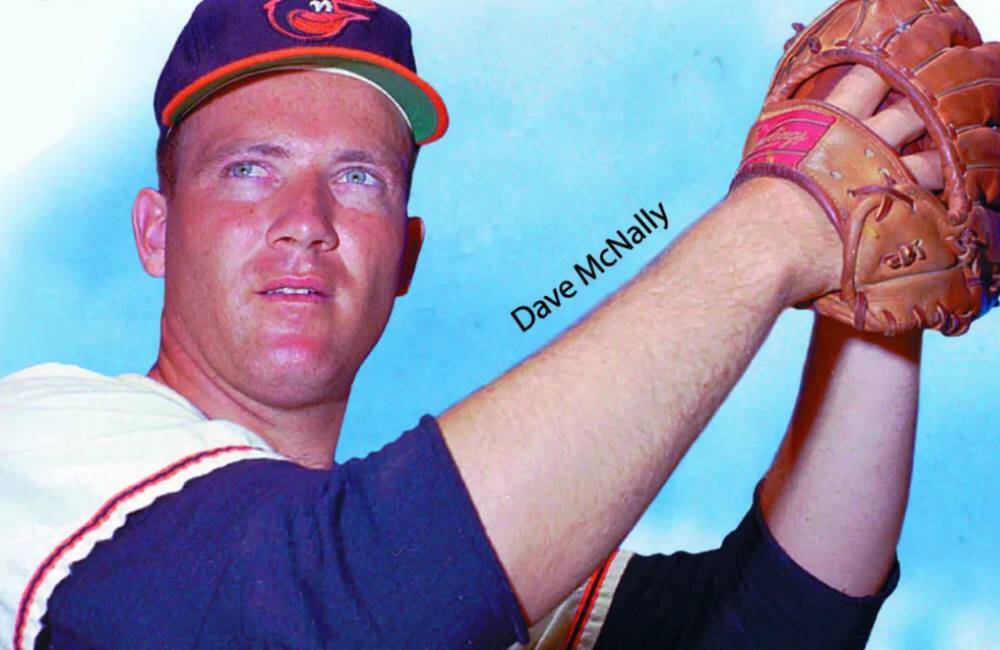Dave McNally is best remembered as the left-handed ace on a Baltimore Orioles pitching staff that won four American League pennants and two World Series. In his first World Series, McNally pitched a Game 4 shutout that finished off the Orioles sweep of the Los Angeles Dodgers.
He’s also known as the only pitcher to ever hit a grand slam in the World Series (he did it in 1970 against the Cincinnati Reds) as well as winning a challenge against baseball’s “reserve clause” that helped usher in the free agency era.
Dave McNally’s Early Life
Dave McNally was born in Billings, Montana, on Oct. 31, 1942. He spent most of his life living in Billings when he wasn’t playing baseball, including running car dealerships there until his death in 2002.
McNally’s father died in World War II, so he was one of four children raised by a single mom who worked in a welfare office. McNally played Little League Baseball and later played American Legion Baseball. He played in the American Legion World Series in 1958.
In 1960, at the age of 17, McNally signed with the Orioles, picking them over the Dodgers.
Minor League Years
Dave McNally spent time in the minors over the next two seasons, elevating his game to where it needed to be to pitch in the majors. In 1961, he started the season with the Orioles Double-A Texas League team in Victoria, Texas. However, after getting knocked around by Texas League hitters, he was sent to play for the Class B Fox Cities Foxes in Appleton, Wis. The manager there was Earl Weaver, who would later manage McNally with the Orioles.
In 1962, he played for the Elmira Pioneers of the Eastern League, which also was managed by Weaver. He pitched so well that the Orioles called him up in September. His first game was on Sept. 26, 1962, in which he pitched a complete game, two-hit shutout against the Kansas City Royals.
In 1963, the Orioles made him a member of the starting rotation.
Dave McNally’s MLB Career
Starting in 1963, McNally settled into a role he would have for his first several years in the majors – the fifth starter and occasional reliever on an Orioles team stacked with great pitchers. He started 20 games in 1963, 23 in 1964 and 29 in 1965. While his innings pitched increased in all those years, his ERA dropped.
By 1966, Dave McNally had earned his way into becoming an important piece of an Orioles starting rotation that included Steve Barber, Wally Bunker, and Jim Palmer. The team easily won the pennant, winning 97 games and finishing nine games ahead of the second-place Minnesota Twins.
In the 1966 World Series, the Orioles faced the other team McNally could have played for: the Dodgers. Manager Hank Bauer gave McNally the ball for Game 1, but he was uncharacteristically wild and ended up leaving the game early. However, he redeemed himself with the Game 4 performance that closed out the series.
Weaver joined the team as a manager in 1968. McNally won Weaver’s first game on July 11. The team made the World Series in 1969, beating the Twins in the first American League Championship Series, but lost to the New York Mets in the World Series.
8 Best World Series of All Time!
In 1970, McNally and the Orioles won the American League pennant again, again beating the Twins in the league championship series. They went on to win the World Series, this time defeating the Reds. McNally started Game 3, and helped his own cause with a grand slam off Wayne Granger.
The team won the pennant yet again in 1971, although this time it was by beating the Oakland Athletics in the championship series, not the Twins. That 1971 Orioles clubs is famous for having four 20-game winners, including McNally. The Orioles lost the series in seven games against the Pittsburgh Pirates.
McNally left the Orioles in 1975, joining the Montreal Expos.
The Seitz Decision
At the end of the 1975 season, even though McNally had decided to retire after the season ended, he agreed to join a grievance filed against baseball that involved him and pitcher Andy Messersmith. Both were being kept on their respective teams (the Expos for McNally, and the Dodgers for Messersmith) because of baseball’s “reserve clause.”
Started in the late 1800s, the reserve clause allowed a baseball team to keep a player for a year after his contract had ended. This could be extended year after year. It effectively kept players from fielding offers for longer contracts from other teams and kept salaries low.
In Dec. 23, 1975, arbitrator Peter Seitz ruled in favor of the players, allowing them to field-free agent offers and effectively ending the reserve clause. McNally, who already was running a car dealership in Billings, retired. Messersmith joined the Atlanta Braves in 1976, followed by the New York Yankees and then a return to the Dodgers before he retired.
McNally lived out the rest of his life in Billings, running car dealerships with his brother. He had married his high school sweetheart, and they had five kids and seven grandchildren. In 2002, he died of lung cancer.
After his death, the Billings Gazette interviewed Pete Cochran, who had played with McNally all those years ago on the American Legion teams when they were teens. He said McNally was a “solid guy, a good leader, just outstanding.”
Cochran also said McNally was a joy to be around all the way to the end. “He was a good friend. I spent about 45 minutes with him eight to 10 days ago. He was telling stories and it was fun to be there.”


Leave A Comment